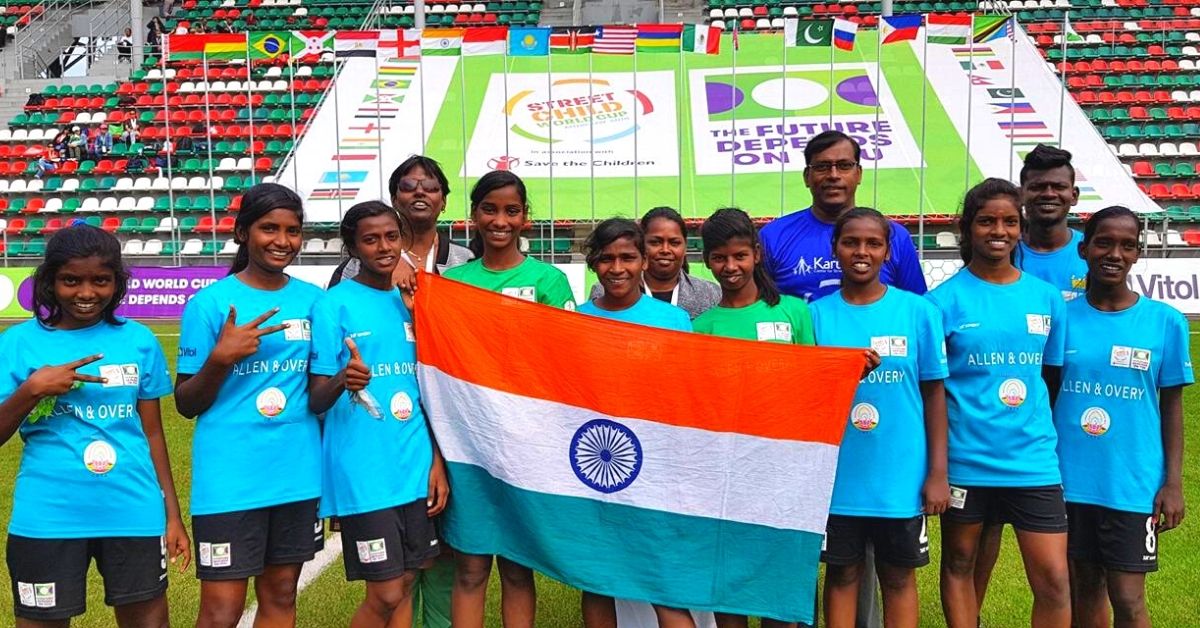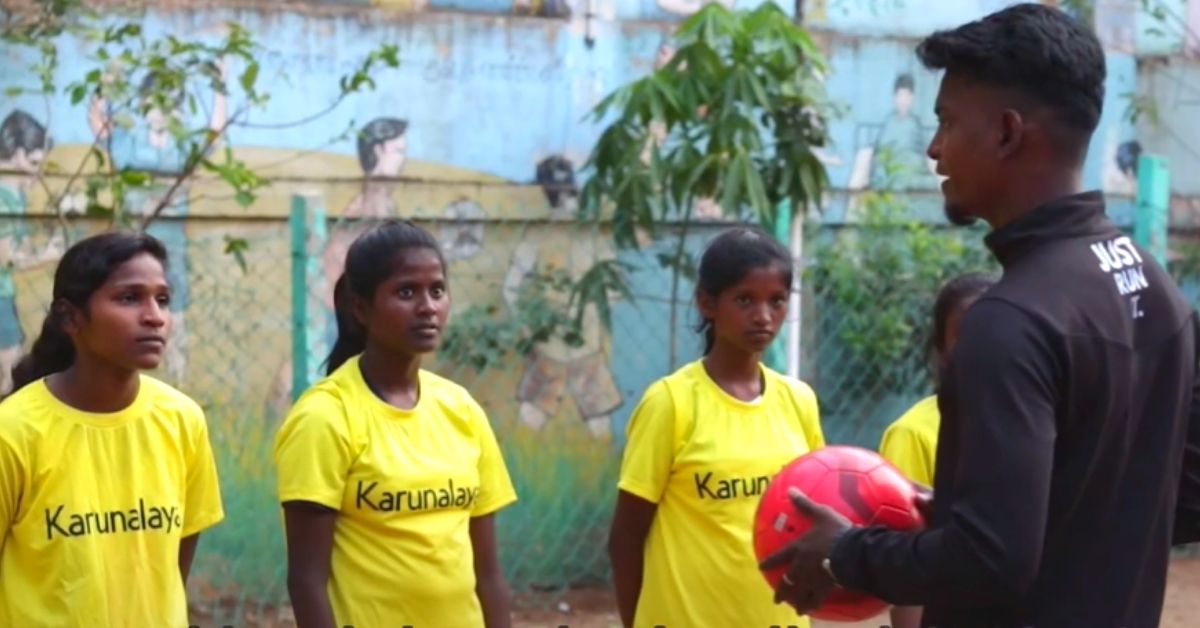Sangeetha Sekar, a soccer player, participated in the Homeless World Cup in Scotland (2016), which required her to replace her old and worn-out garments with a fresh new gleaming blue jersey. Swanky sneakers replaced her damaged slippers, and she didn't have to select between drinking milk and eating eggs for the first time in a long time.
Sangeetha had already become accustomed to a horrific existence and learned how to deal with the risks of living on the streets, including violence, infections, and hunger, by the time she was 16 and picked to play in the World Cup. Despite this, she was frightened of leaving her mother behind and travelling to another continent. Perhaps it was the fact that she would be confronted with a contrasting reality that would remind her of her destitute life.
Throughout the tournament, though, she did not show any signs of stress or dread on her face. As the Indian team's captain, she, on the other hand, put up an outstanding performance. Her quickness and endurance during the 90-minute matches were favourably praised throughout the tournament. No one would believe that Sangeetha grew up and lived on the streets of Chennai, given the ease with which she scored goals against her opponents.
She made her mark again two years later, in Russia, at the Street Child World Cup, a tournament that takes place every four years before the FIFA World Cup. Her performance drew global attention, and the media waited in line on Wall Tax Road in Georgetown, where she lived, to know more about her story.
Sangeetha, now 20, said that “playing in the park, going to school, or affording a four-square lunch were pleasures that didn't exist in my life. No one, including myself, believed I could do it when I finally got a chance to carve out my own identity and thrive at a sport. However, I succeeded.”

Sangeetha discusses what motivated her during her journey, as well as how she overcame social biases and made India proud.
Amid a life of struggle
Sangeetha's makeshift house is in the midst of Chennai's bustling streets, with honking cars, throngs of people wandering on the sidewalk, and the city's blistering heat. She grew up surrounded by garbage, frail-looking children begging for food, and municipal workers pressuring residents to clear the sidewalk.
When her alcoholic father abandoned their five-member family when she was just three or four years old, she was left to care for herself. Sangeetha's mother and older sister worked odd jobs like wage laboring and mopping people's houses in order for her and her siblings to attend school.
Living on the street with only a few plastic sheets to keep their privacy was difficult, particularly knowing her gender. “Because they know no one will defend us, girls are frequently subjected to eve-teasing, males passing inappropriate comments, and harassment by the mighty. Taking a bath or using the restroom are still considered luxuries for us,” Sangeetha explains.
Due to extreme poverty, she was forced to drop out of school in Class IX and work for a utensil manufacturing company across the street. Her minimum-wage work entailed melting old silverware and polishing new ones. She did, however, leave soon after, which turned out to be a gift in disguise. Around the same time, the Karunalaya NGO, which advocates for children's rights, decided to assist Sangeetha.
She was re-enrolled in school, and members of the NGO would tutor her after school.
Sangeetha's passion for football was quietly brewing even while she battled poverty, managed her studies, and worked as a child labourer. Watching matches on the common TV on the street was originally an escape from her problems, but as she saw and learned more about the game, she grew to enjoy it even more.
She told the NGO about her wish to play football, and they linked her with a coach who works with school students. Sangeetha claims that this was the turning moment in her life.
‘Soccer Sangeetha’
Listening to taunts from her family and neighbors was not as difficult as learning the sport. They made fun of her for wearing shorts and wasting time mastering a useless sport that didn't provide a steady wage. Her mother, Selvi, eventually gave in after the NGO intervened and allowed her to play.
“ I recognized that this was what she wanted to do, and I backed her up when she began to win medals. Others quickly noticed how well she was doing as well. We're all very proud of her now,” Selvi said.
Sangeetha quickly established a caliber for the sport as a result of her dedication and hard work. She practiced before and after school, as well as at night under the streetlights. A month later, she competed in her first local event, the ‘Slum Soccer Games’, and wowed everyone. The girls' squad of Karunalaya then went on to win another game.
Her confidence and spirits were boosted when she won her first Best Player Award in her life. Her local fame grew as a result of her achievements, and she became known as ‘Soccer Sangeetha.'
She was chosen to play her first-ever international match with the support of her coach. Sangeetha was the only girl from Tamil Nadu to be chosen. Since then, there has been no turning back.
“I am grateful to the NGO since they enabled a girl like me to not only afford dreams but also realise her ambitions. Seeing my mother and sister struggle to feed us on a daily basis was heartbreaking, so I worked hard and chose to pursue football professionally,” Sangeetha adds.
Shikha Kumari, Mohit Arora, and Aishwarya Ashok turned Sangeetha's incredible journey into the award-winning seven-minute short film "Made in Madras" in 2019. The film was selected as the 2019 MY HERO People's Choice winner after screening at a number of festivals, including the Chicago Reels Fest.
Sangeetha's life hasn't changed much. Her mother is a daily wager , and she still lives on the streets. What has changed is her definite career path, which she has already begun. At Queen Mary's College, she is studying for a B.Sc. in Physical Education. She aspires to become an IAS officer so that she can utilize her position to help homeless children.

She also wants to open a free football academy for youngsters who live in slums and on the streets.
Also Read: #FirstStoryPositive: Meet these 5 students who have raised Rs 4 lakh to help less-privileged people
“I want to utilize football to make a difference in people's lives. It has altered my life; now it is time for me to pay the favor” Sangeetha concluded.
See her documentary here
